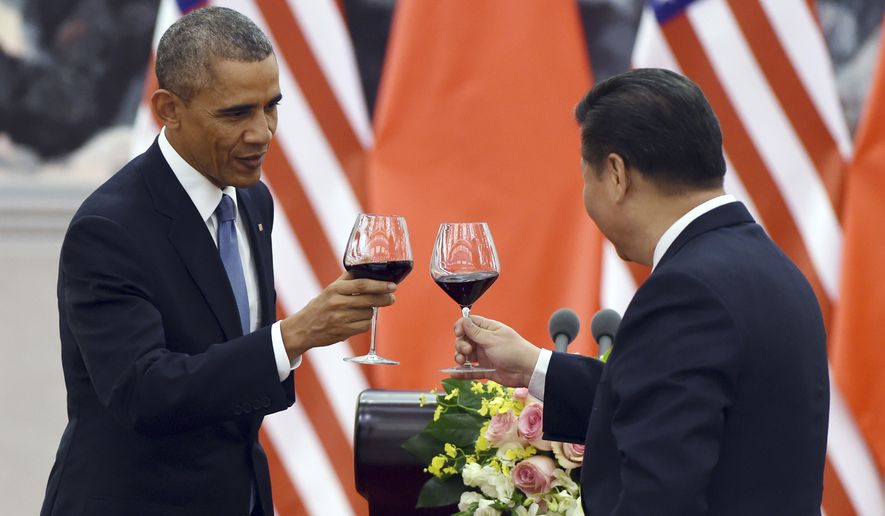China has become one of the world’s largest two economies, and is wealthy enough to buy up at least $1.3 trillion of the U.S. debt. But that hasn’t stopped Uncle Sam from continuing to send foreign aid to Beijing.
In 2014 the U.S. State Department and its USAID program provided nearly all of the $12.3 million in taxpayer-funded aid set aside for China. And another $6.8 million is on tap for Beijing this year, according to ForeignAssistance.gov.
In the big picture of things, China’s aid package — mostly centered around pollution and pro-democracy programs — is a mere drip from a foreign aid spigot that has been as great as $50 billion annually in recent years. But taxpayer watchdogs say it’s a classic example of the U.S. government not being able to reign in aid on projects whose effectiveness is immeasurable and could easily be funded by the country itself.
“The idea that China needs this foreign aid, and that it can make any difference in China, is laughable,” said Ian Vasquez, director of the Center for Global Liberty and Prosperity at the Cato Institute, a libertarian think tank.
“In essence, what we’re doing is borrowing from China and giving some of that money back to China, so it’s a loan with interest. This is an expensive way to do business,” Mr. Vasquez said.
For sending Americans’ tax dollars to a well-heeled country capable of helping itself, the Department of State and USAID win this week’s Golden Hammer, a weekly award given by The Washington Times to highlight examples of questionable federal spending.
PHOTOS: See Obama's biggest White House fails
A spokeswoman for USAID said this year’s funding was being directed to programs in Tibet, an unrecognized state within the People’s Republic of China that has continually sought independence from the country. USAID will contribute $4.5 million to the total requested $7 million.
“Programs will help Tibetan communities improve their livelihoods, promote sustainable development and environmental conservation, and preserve their threatened cultural traditions. Funds will build upon prior successes such as the establishment of a digital archive of classical Tibetan texts and knowledge maps, which has been accessed by over 17,000 Tibetans to date.
“Also, at the direction of Congress — and not included in the President’s [fiscal year] 2016 request — USAID currently provides assistance to China to address environmental conservation and strengthen rule of law,” the spokeswoman said, adding that those funds are directed to NGOs and U.S. educational institutions, not directly to the Chinese government.
A spokesperson for the State Department did not respond to a request for comment.
William Wilson, a senior research fellow at The Heritage Foundation who spent several years working in Beijing, said the aid is meant to be an investment to promote U.S. interests that will eventually produce a return for the U.S. in terms of greater environmental protections, greater human rights and improved democracy and rule of law. He said taxpayers shouldn’t be too concerned unless the money ends up being wasted on unsuccessful projects.
“It’s small; it’s to promote American interests. The big question is, is it working? That’s hard to say,” Mr. Wilson said. “Does it have a positive rate of return? If it doesn’t, then it’s a waste of money.”
SEE ALSO: China threatens to arm Hawaii separatists who want kingdom
But Mr. Vasquez argued that if China isn’t already making an effort with its own resources to fix those problems, then it’s unlikely that the aid projects will be successful.
“If the U.S. thinks there isn’t much of an interest without the U.S. paying for stuff, then that aid isn’t very promising,” he said.
Critics say that China has not proven itself to be a good economic partner for America, costing the U.S. billions annually in intellectual property theft and continually blocking U.S. exports to the country.
“It’s fine to make a deal with China that benefits Americans. If China wants to buy a stake in an oil field in Texas or a hotel somewhere, that’s fine. But it’s different for American taxpayers to give China any amount of money when they’re not poor, and they’re not a cooperative partner; they do a lot of things to harm the American economy,” said Derek Scissors, a resident scholar at the American Enterprise Institute. “When it’s a voluntary transaction, buying Chinese goods is fine, but taking money [away] from the American taxpayer — even a tiny little bit of money — [should] not [go to] the Chinese.”
Experts agreed that the amount of money being funneled to China is relatively small compared to the scale of moneys flowing to foreign aid projects on the whole, and given China’s financial stability and strained economic partnership with the U.S., that small amount of aid could easily be revoked.
“It’s a small amount. Seven million is a drop in the bucket, so why send any at all?” Mr. Wilson asked.
“We’re not talking about sanctioning them, we’re talking about not taking a little bit of taxpayer money and not giving it to them because they don’t deserve it,” Mr. Scissors said.
• Kellan Howell can be reached at khowell@washingtontimes.com.




Please read our comment policy before commenting.